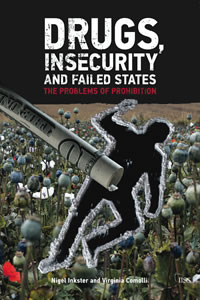The medical marijuana supporters who organized Montana's IR-124 initiative want it to lose. That's because it's a referendum on a bad medical marijuana law passed by the legislature last year. If it loses, the bad law dies.
With marijuana legalization initiatives heading to the ballot, some with a good chance of passage, and with growing international support for a real debate on prohibition, people are talking about drug policy like they never have before. Our new book offers will help you be part of that conversation, while our new video offer will remind you why we should be angry too.
We're getting down to the final days, and the action around drug reform initiatives is fierce.
It's been a relatively quiet week on the medical marijuana front, with the big news being the DC Circuit Court's interest in determining whether Air Force vet Michael Krawitz has standing to challenge the federal government's refusal to reschedule marijuana. But that isn't all.
New polls show Washington's I-502 still leading, but Oregon's Measure 80 doing badly.
In a presidential debate virtually ignored in the US, three of four third party presidential candidates called for marijuana legalization and criticized the war on drugs.
Marijuana politics in Colorado could have a major impact on the presidential race.
Chalk one up for the NJ Weedman. The longtime activist and gadfly convinced a New Jersey jury to ignore the law and acquit him of marijuana possession with the intent to distribute.
France is about to become the latest European country to allow supervised injection sites to operate. Some could be open by year's end, the French health minister said.
Parties trying to form a new government in the Netherlands are trying to reach a compromise on the controversial "weed pass" system for cannabis cafe customers. So far, it looks like foreigners will lose out.
A 60-year-old Georgia homeowner is dead after allegedly pointing a canister of pepper spray at police doing a drug raid at his home.
Small town police chiefs gone wild! Junkie cop sells stolen police guns to dealer! More crooked cops go down in stings!
Last year wasn't a good year for medical marijuana in Montana. Between the federal raids in the spring of 2011 and the Republican-dominated legislature's efforts first to repeal the voter-approved 2004 medical marijuana law, which was vetoed by Gov. Brian Schweitzer (D), and then to gut it with Senate Bill 423, which Schweitzer reluctantly allowed to become law, the state's medical marijuana industry has been practically decimated.
But although 2012 is nearly over, Big Sky County medical marijuana supporters are hoping this year will end up differently. That's because they have an initiated referendum on the ballot,
IR-124, that would undo the legislature's passage of Senate Bill 423 and restore the status quo ante.
From an initiative organizer's standpoint,
IR-124 has some interesting attributes. First, the medical marijuana people behind
IR-124 want it to be defeated. A "no" vote on the initiative is a vote
against Senate Bill 423, and the conventional wisdom on initiatives is that voters who are uncertain on an issue vote "no." Second,
Montanans who oppose the free-wheeling medical marijuana system that was in place prior to Senate Bill 423 may well be confused by the fact that
IR-124 is being run by medical marijuana supporters and vote "no" mistakenly thinking they are voting against medical marijuana.
"Our opponents have accused us of muddying the water, but it wasn't a strategic ploy; it's just a thumbs up or thumbs down on the current law," said Chris Lindsay of the
Montana Cannabis Industry Association, which is fighting SB 423 in the courts as well as supporting
IR-124.
There hasn't been a lot of polling on
IR-124, but what there is suggests repeal of SB 423 could well be within reach. There has been no scientific polling this month, but
two September polls, one from Mason-Dixon and one from Public Policy Polling, had
IR-124 losing with 44% and 46% of the vote, respectively. And that's just what
Patients for Reform -- Not Repeal, the primary group behind the campaign, wants.
"We're urging voters to vote 'no' on
IR-124, because it is a slap in the face to voters as well as cruel and harmful to the seriously sick patients
Montanans sought to help," said Bob Brigham, campaign manager for the group. "The legislature should have fixed the medical marijuana program, not broken it completely with a 'repeal and destroy' law," he explained. "With the federal government also punishing patients and providers and even threatening their gun rights, it is vitally important that Montana voters stand solidly for their own rights."
But while the polls had
IR-124 losing, campaign proponents aren't feeling comfortable. Those same polls showed only around 30% of voters committed to voting "no," with about 25% of voters undecided. While undecided voters typically break towards a "no" vote on initiatives, Patients for Reform -- Not Repeal is going to have to win about four out of five of those undecided voters to undo SB 423.
The campaign is counting on Montana voters to reject the legislature's interference with the voter-approved 2004 initiative that established the state's medical marijuana program, Brigham said.
"We're calling attention to the fact that this is an issue that revolves around voter rights and the will of the people," he said. "Rather than work on consensus proposals for strict regulation, all the legislature wanted to do was repeal the law voters had adopted -- and they did it twice. Senate Bill 423 was written deliberately to accomplish complete repeal. The tragedy is that the very patients
Montanans care about, the sickest among us, are now suffering unnecessarily and unfairly as a result," Brigham concluded.
Under the 2004 law, and especially after the Obama administration took office and signaled it would not target medical marijuana patients and providers, the Montana medical marijuana scene took off, with dispensaries and multi-patient grow operations sprouting up and some entrepreneurs pushing the limits of public acceptance by pulling stunts like taking recommendation-writing caravans across the state and publicly smoking marijuana.
The legislature's attempted outright repeal, followed by SB 423, was in part in a response to the perceived excesses of the program. But SB 423 pretty much wiped out everything except patients growing their own. It limited growers to three patients each, prohibited providers from being compensated, gave local governments the ability to ban dispensaries, tightened standards for demonstrating chronic pain, and required doctors who recommended marijuana for more than 25 patients in a year to undergo reviews at their own expense.
The Montana Cannabis Industry Association has been fighting SB 423 in the state courts, but in August, the state Supreme Court overturned a lower court injunction blocking most of its provisions from taking effect. Now the high court is set to rule on a final appeal from the group any time now. Lindsay said Tuesday morning he hoped the election would come before the court rules.
"The moment the Supreme Court is done, we expect that 5,500 Montana patients will be told they no longer have a provider and they will have to find a new one, which is unlikely, or grow their own," he said. "We're hoping we get to the election first, because a victory there would render moot what the Supreme Court is considering."
That didn't happen. Tuesday afternoon, the state Supreme Court ruled against the Montana Cannabis Industries Association.
"We expect the Department of Health and Human Services to start sending letters out to 5,500 patients saying they no longer have a provider," Lindsay said in a late afternoon call to the Chronicle breaking the news.
While the late ruling hurts patients, it may prove a boon to the "no" campaign. Now, patients and providers who may have thought that life under SB 423 would not be so bad are being confronted with the reality of its actual implementation.
It will probably also make life tougher for supporters of SB 423. Although there isn't a lot of organized support for the law, it does have cheerleaders among the Republican legislators who passed it and among social conservative groups like the Billings-based Safe Communities, Safe Kids.
But Safe Communities, Safe Kids doesn't have money for much of an advertising campaign and is relying on local radio and TV talk show appearances to get its message out. It also tried holding a
press conference last week to attack state Attorney General Steve Bullock over the ballot language, but that didn't work out too well for the church ladies.
"You're trying to pull a political stunt using a mechanism that is not set up for this purpose," said Jim Molloy, an assistant attorney general to Bullock, who crashed the press conference and noted that the ballot language had been vetted and settled on two months ago. The threat to file a late complaint was "nothing more than political theater," he said.
"We didn't realize it was going to be such a big problem until the ballots came out," the group's Cherie Brady tried to explain. She said after absentee ballots came out on October 9, her group began getting calls from voters unsure of how to fill out their ballots.
While foes of medical marijuana are reduced to morning talk shows and exploding press conferences, Patients for Reform -- Not Repeal is running limited radio and
TV ads urging a "no" vote. It is also preparing a final push to get voters to the polls on election day.
"It's an exciting campaign," said Lindsay. "We've got a lot of momentum behind trying to repeal the law. We're hoping for the best."
back to top
Dear Drug War Chronicle reader:
With marijuana legalization initiatives heading to the ballot, some with a good chance of passage, and with growing international support for a real debate on prohibition, people are talking about drug policy like they never have before. And so two of our three new offers for donating members come from the academic world rather than activist reformer circles:
Marijuana Legalization: What Everyone Needs to Know and
Drugs, Insecurity and Failed States: The Problems of Prohibition.
This is also a time of continuing outrages in the government's drug war, including the federal campaign against medical marijuana. And so our third new offer is the DVD
Lynching Charlie Lynch, by director Rick Ray, telling the story of one of California's most respected and responsible medical marijuana providers, now facing time in federal prison. (Follow the three links above for Drug War Chronicle reviews of each of these works.)
Donate $35 or more to StoptheDrugWar.org, and you will be eligible for a complimentary copy of any one of these items. Donate $65 or more and you'll be eligible for any two. Donate $95 or more and you can receive all three. (Each of these items, and each combination along with other available items, can be found in the "membership premiums" section of our
online donation form, under the indicated minimum total.)
At a time like this -- when people are talking about drug policy like never before -- the movement's internet strategy is also more important than ever before. So please support our work with a generous donation by credit card or PayPal today. You can also donate by mail -- info below.
Lastly, please note that even with a nonprofit, bulk discount, we spend a significant amount to purchase these items and send them to you -- if you can afford to donate more than the minimum, or to supplement your donation with a continuing monthly contribution, I hope you'll consider doing so. If gift items are not important to you, I hope you'll consider sending a donation that's entirely for our work.
Donations to our organization can be made online at
http://stopthedrugwar.org/donate, or they can be mailed to:
DRCNet Foundation (tax-deductible), P.O. Box 18402, Washington, DC 20036; or Drug Reform Coordination Network (non-deductible for lobbying), same address. (Contact us for information if you wish to make a donation of stock.)
Thank you for standing with us to stop the drug war's cruelties and meet the opportunity this time offers to make a brighter future. And don't get discouraged by the challenges our movement and the cause are currently facing:
Time, and the truth, are on our side!
Sincerely,

David Borden, Executive Director
StoptheDrugWar.org
Washington, DC
http://stopthedrugwar.org
back to top
We're getting down to the final days, and the action around drug reform initiatives is fierce. Let's get to it:
National
On Sunday,
the Obama administration said it would be unswayed if one or more states voted for marijuana legalization. Appearing on CBS's "60 Minutes," Deputy Attorney General James Cole, author of the infamous "Cole memo" authorizing the current federal offensive against medical marijuana dispensaries, said the federal government was ready to fight any "dangers" from legalizing marijuana. He said the administration's stance on legalization would be "the same as it's always been" regardless of what voters decide. "We're going to take a look at whether or not there are dangers to the community from the sale of marijuana and we're going to go after those dangers," Cole said.
Arkansas
Last Thursday
, a state agency head distributed talking points against Issue 5, the state's medical marijuana initiative. Jennifer
Gallaher, head of the Arkansas Division of Behavioral Health Services, issued the talking points, which consistently refer to "medical" marijuana. A spokesperson for the Department of Human Services defended the propriety of the talking points, noting that "Mrs.
Gallaher's office gathered factual information on the issue and shared it with her staff, which is absolutely appropriate given what that division does."
Also last Thursday,
TV talk show host Montel Williams visited the state to campaign for Issue 5. He appeared at a campaign event at the state capitol along with members of Arkansans for Compassionate Care. Williams, who suffers from multiple sclerosis, has become a strong public advocate for medical marijuana. Williams and others present used to occasion to criticize as racist an
anti-Issue 5 ad put out by the conservative Family Council Action Committee. The ad at one point features a scary looking black man measuring out marijuana.
Last Friday,
the state's top anti-drug official and the Chamber of Commerce came out against Issue 5. State Drug Director Fran
Flener said she and the groups planned to speak out against the measure. "While our group's vision of compassion does not include smoked marijuana as a medicine, it does include elements that we consider equally important measures of compassion,"
Flener said. She said those include "compassion for our citizens who travel our roads and our highways," ''the prevention of the establishment of crime-ridden dispensaries" and "the prevention of marijuana abuse particularly by children and teens." Also joining
Flener in opposition were the Arkansas Sheriffs Association and the Arkansas Association of Chiefs of Police. The groups plan to air advertisements against the measure.
On Monday,
the co-chair of the legislature's Joint Budget Committee endorsed Issue 5. Rep. Kathy Webb (
D-Little Rock) said she had already voted for it. Early voting began Monday.
On Tuesday,
GOP Congressman Tim Griffin said he opposes Issue 5. His Democratic, Green, and Libertarian challengers have all said they support it.
On Wednesday,
a group of doctors said they opposed Issue 5. Led by Little Rock Dr. David Smith, the group said marijuana hasn't been scientifically proven as a treatment to relieve suffering.
California
On Tuesday,
Grover Norquist penned an op-ed supporting Proposition 36, the Three Strikes sentencing reform initiative.
Norquist, the conservative head of Americans for Tax Reform, wrote that "It is unjust and foolhardy to waste precious prison resources on nonviolent individuals who pose no criminal threat to our communities (while releasing violent criminals). These nonviolent offenders should be punished -- but conservatives should insist the punishments are fair, effective and efficient. Proposition 36 is a reform all conservatives can and should support."
Colorado
Last Wednesday,
the Campaign to Regulate Marijuana Like Alcohol released its second TV ad. The message of the ad is simply and direct. Marijuana is not dangerous and government resources currently wasted enforcing marijuana prohibition would be much better spent elsewhere.
Last Thursday,
actress Susan Sarandon began voicing robocalls for Amendment 64, the state's marijuana legalization initiative.
Sarandon is on the advisory board of the Marijuana Policy Project, which has contributed more than a million dollars to the campaign.
Last Friday,
Amendment 64 supporters rallied at Colorado State University in Fort Collins. Libertarian presidential candidate Gary Johnson was there and told attendees "Colorado has the opportunity to change drug policy worldwide."
On Monday,
Denver Mayor Michael Hancock came out against Amendment 64, saying he feared it would make Denver "a marijuana capital." The Amendment 64 campaign quickly counterattacked, saying "We are disappointed that Mayor Hancock is not basing his public policy on evidence. It is well-established that the gateway effect is not an effect of marijuana itself, but rather of marijuana prohibition. When you want to buy a six pack of beer -- a substance our elected officials are happy to celebrate -- you go to the store and buy a six pack, and the cashier doesn't offer you harder drugs. The same cannot be said for the gangs and cartels, who our opponents seem to prefer be in charge of the vast non-medical marijuana market in Colorado."
Massachusetts
On Monday,
opponents and proponents of Question 3, the medical marijuana initiative, held dueling press conferences. Opponents from law enforcement and elected officials denounced it as "vague, ambitious, and open to exploitation" and warned that the path to death from drug abuse starts with "smoking that innocent little joint." But proponents of the measure, including Dr. Karen
Munkacy, scoffed. "There's no property of medical marijuana that causes people to die," she said, adding that medical marijuana is a "gateway backwards," leading people off of addictive and harmful painkillers.
Also on Monday,
the conservative Boston Herald came out against Question 3, warning that it was "the camel nose under the tent" for "the pro-pot lobby." Marijuana is not like other medicines, the Herald opined, because it isn't FDA approved. Worse yet, the campaign is "bankrolled by a wealthy pro-pot pooh-bah" (Peter Lewis) and "is part of a broader effort to normalize its sale and use."
Montana
See our feature article about the Montana medical marijuana initiative this week
here.
Oregon
Last week,
phone banking for Measure 80, the state's legalization initiative, got underway. A joint project of Firedog Lake and
Oregonians for Law Reform, the phone bank push allows you to call Oregon voters to encourage them to vote yes on Measure 80. Firedog Lake has been doing the same thing in Colorado for some weeks now.
Last Friday,
the Portland Mercury endorsed Measure 80. The Mercury is the state's second largest alternative weekly. It joins the state's largest alternative weekly, the Willamette Week, which has also endorsed the initiative.
Also last Friday,
Measure 80 was still trailing in the polls. The latest poll from
SurveyUSA had it losing 36% to 43%, but with nearly one-quarter of the voters still undecided.
WashingtonAs of Tuesday, I-502 was maintaining a lead in the polls. A Strategies 360 poll had the marijuana legalization initiative leading 54% to 38% with 7% undecided. In two polls late last week, it was leading 55% to 36% in one and 47% to 40% in the other, which queried only likely voters.
(This article was published by StoptheDrugWar.org's lobbying arm, the Drug Reform Coordination Network, which also shares the cost of maintaining this web site. DRCNet Foundation takes no positions on candidates for public office, in compliance with section 501(c)(3) of the Internal Revenue Code, and does not pay for reporting that could be interpreted or misinterpreted as doing so.)
back to top
It's been a relatively quiet week on the medical marijuana front, with the big news being the DC Circuit Court's interest in determining whether Air Force vet Michael Krawitz has standing to challenge the federal government's refusal to reschedule marijuana. But that isn't all. Let's get to it:
National
On Monday,
plaintiffs in the federal marijuana rescheduling case filed an additional brief at the court's request after it heard oral arguments last week. In the case
Americans for Safe Access v. Drug Enforcement Administration, the DC Circuit issued an order last week seeking details on the harm sustained by plaintiff and disabled US Air Force veteran Michael
Krawitz as a result of the federal government's policy on medical marijuana. The federal appeals court will use this additional briefing to decide whether the plaintiffs have legal "standing" to bring such a lawsuit against the government. The lawsuit argues that the government has acted arbitrarily and capriciously by keeping marijuana classified as a Schedule I substance, a dangerous drug with no medical value. By ignoring the overwhelming scientific evidence,
ASA argues that the federal government has kept marijuana out of reach for millions of Americans who would otherwise benefit from its therapeutic value.
Arizona
Last Friday,
a lawsuit against Maricopa County officials for refusing to process dispensary applications got underway. The White Mountain Health Center filed a lawsuit against Maricopa County after it refused to provide documentation and information required in order to obtain a dispensary permit under the voter approved 2010 Arizona Medical Marijuana Act. White Mountain was the first to apply for a dispensary permit under county jurisdiction, but Maricopa County DA Bill Montgomery opposes the Arizona Medical Marijuana Act because he says it would force public employees in Arizona to violate federal drug laws that prohibit the use, sale and cultivation of marijuana. Lawyers from the ACLU, who are representing White Mountain, argued that the state has the right to have a medical marijuana law, and that the federal government has not punished officials in any of the other 17 states where it is legal. The case continues.
California
Last Friday,
San Francisco's first unionized dispensary opened. The Mission Organic Center applied for its permit more than three years ago, but had to navigate the permit process and overcome an appeal at City Hall before opening. Dispensary owner Eugene
Popov has been paying rent on the storefront the whole time, as well as shelling out $10,000 in permit fees. The United Food and Commercial Workers Local 5 has supported the dispensary throughout the process and now has the union shop dispensary in the city.
Also last Friday,
neighbors of a Berkeley dispensary threatened to sue the building owner if the dispensary does not stop "all illegal drug activities at the location" associated with the Perfect Plants Patient's Group. Residents complained of bags from the business in neighborhood yards, drug deals openly occurring on the street and kids loitering and smoking marijuana, all of which they attribute to the continued operation of the dispensary. The city is contemplating ordering the dispensary shut down, but the neighbors issued their lawsuit threats because they felt the city wasn’t moving fast enough. The dispensary is not on the city's list of permitted dispensaries.
On Wednesday,
the San Francisco Weekly revealed that Mayor Ed Lee blocked a plan to let shuttered dispensaries operate on city property. The number of dispensaries in the city has shrunk from 30 to 20 under the federal onslaught, and city officials had bruited about the idea of letting some of them open on city property while they sought new locations. But Lee's office nixed the idea earlier this month, according to emails retrieved by the Weekly.
Late Wednesday afternoon, an alert went out on the San Diego Americans for Safe Access email list saying San Diego's only known dispensary, Next Generation on San
Ysidro Boulevard, was being raided. The dispensary is "currently under attack and in full raid condition," the alert said.
Michigan
On Wednesday,
a Big Rapids medical marijuana provider was sentenced to federal prison. John Clemens
Marcinkewciz was a registered caregiver when he was arrested on state charges, which were then handed off to the feds. After the federal court ruled that he could not mention the state's medical marijuana law in his defense, he pleaded guilty to conspiracy and manufacture of 100 or more marijuana plants. While there was no word at press time what sentence he received, he was looking at at least a five-year mandatory minimum.
Oregon
Last week,
Lane County authorities filed an asset forfeiture complaint against a dispensary they raided in August. They hit
Kannabosm on August 30 and arrested the owner, Curtis
Shimmin, on marijuana and money laundering charges. The store had been open for a year. Now, they want to seize $60,637 in cash,
Shimmin's personal automobile, and an ATM machine that was at the business.
Shimmin had argued that cash-for-marijuana transactions were not illegal under the Oregon Medical Marijuana Act because they were not technically sales, but compensation to growers for their expenses. Lane County begged to differ.
back to top
New polling data released in the past week shows Washington's I-502 marijuana legalization initiative still ahead, but not comfortably so, and Oregon's Measure 80 continuing to trail. The polls come as the campaign season enters its final weeks.
In Washington, a
SurveyUSA/KING 5 News poll showed I-502 winning with 55% in favor and 36% opposed. Only 8% said they were still undecided. That's good news since because it suggests that for I-502 to lose, it would not only have to lose every undecided voter, but also one out of ten of the people who say they are voting for it.
But a second poll, released Thursday, is a bit more concerning. In the
KCTS 9 Washington poll of registered and likely voters, I-502 led by 50.9% to 40.8% among registered voters and 47.1% to 40.1% among likely voters. That's still a seven-to-ten-point lead, but the measure polls that high only when counting not only "certain" yes voters, but also "Yes -- could change" and "Undecided -- leaning yes" voters.
Using only "certain" voters, the race gets tighter. Among registered "certain" voters, 38.4% were voting yes, while 35.0% were voting no. Among likely "certain" voters, 37.2% were voting yes, while 31.8% were voting no.
I-502 still appears favored to win, but it's white-knuckle time for those steering the campaign.
It's not looking as good in Oregon. Measure 80 continues to trail in a new
SurveyUSA poll and is in fact declining slightly in popularity from a
SurveyUSA poll done five weeks ago. Only 36% of respondents said they were voting for Measure 80, while 43% said they were voting against. The initiative has lost one point since the previous poll, while the opposition has gained two points.
That still leaves more than one out of five voters undecided, meaning Measure 80 could theoretically still triumph. But it would have to hold onto all of its "yes" voters and pick up two-thirds of the
undecideds to do so, and that is an exceedingly tall order.
Measure 80 has majority support among only one demographic group, liberals, where it garners 60%. It has lost previous majority support among Democrats and independents and trails among all age groups. It looks like it will be back to the drawing board for Oregon activists.
back to top
Three of four third party presidential candidates used a Tuesday night debate to come out in favor of marijuana legalization and to criticize drug prohibition in general. Neither the topic of marijuana legalization nor the larger topic of the war on drugs was mentioned in the three separate debates between President Obama and Republican challenger Mitt Romney.
Third party candidates were excluded from those debates.
Unlike the major party presidential debates, which were carried live by multiple mainstream media outlets, the debate sponsored by the
Free and Equal Elections Foundation suffered a virtually media blackout in the US, but was broadcast by Russia-based RT TV and Al
Jazeera News.
"We don't need to just legalize marijuana in this country, we need to end drug prohibition just as we did alcohol Prohibition, and treat drug use and abuse as a public health and educational issue and get it completely out of the criminal justice system," said former Salt Lake City mayor
Rocky Anderson, presidential candidate for the Justice Party.
"I'm not for legalizing drugs. If you want that, vote for one of them. Don’t vote for me," said independent candidate
Virgil Goode, a former Virginia Republican congressman.
Goode added that federal funding for the war on drugs should be reduced and that enforcement should primarily be a state issue. He then went on to suggest other areas of federal funding that he would like to see reduced, leaving moderator Larry King to remind him to stick to the topic at hand.
"We're on drugs. We're on drugs," King said.
Libertarian candidate
Gary Johnson followed Goode, and there were no surprises from the long-time advocate of legalization.
"Let's legalize marijuana now -- and right now in this country, we are on a tipping point on this issue," he said to enthusiastic cheers. He added that he is not "advocating drug use," but rather acknowledging that it is an "issue that belongs with families, not in the criminal justice system."
"I am not a hypocrite on this issue," Johnson said. "I have drank alcohol, I have smoked marijuana… In no category is marijuana more dangerous than alcohol. And yet we are arresting 1.8 million people a year in this country on drug-related crime."
Last up was Green Party candidate Jill Stein, who drew on her career as a doctor to challenge the war on drugs.
"Marijuana is a substance that is dangerous because it’s illegal," Stein said. "It's not illegal on account of being dangerous, because it's not dangerous at all."
The Free and Equal Election Foundation will hold another debate on October 30. It asked viewers to
rank the four candidates in order of preference, with the top two
vote-getters moving on to the final debate, but no results have been announced yet.
(This article was published by StoptheDrugWar.org's lobbying arm, the Drug Reform Coordination Network, which also shares the cost of maintaining this web site. DRCNet Foundation takes no positions on candidates for public office, in compliance with section 501(c)(3) of the Internal Revenue Code, and does not pay for reporting that could be interpreted or misinterpreted as doing so.)
back to top
Colorado is a tightly-contested swing state. According to the Real Clear Politics average of recent polls, Republican challenger Mitt Romney holds a vanishingly narrow lead over President Obama of 47.8% to 47.6%. In a national election that appears to be growing tighter in the final weeks, Colorado could end up deciding who wins.

Gary Johnson
It is also a state where there are two reasons marijuana is at play as a political issue. Most significantly, it is the site of the
Amendment 64 Regulate Marijuana Like Alcohol legalization campaign, which maintains a shrinking lead in recent polls, and which has generated reams of media coverage in recent weeks. But it is also one of the medical marijuana states that have seen their dispensary systems threatened by heavy-handed federal interventions, which has generated ill-feeling toward the Obama administration in some quarters.
And it is a state where Libertarian Party candidate Gary Johnson, the former Republican governor of neighboring New Mexico, is making a strong push, with marijuana legalization and marijuana policy as one of his strongest talking points. Johnson isn't included in those polls mentioned above, but when pollsters do bother to include him, as
Public Policy Polling did last month and
Politico did this month, he's bringing in about 5% of the vote -- and he takes three votes away from Obama for every two he takes from Romney. [Update:
The latest PPP poll, released Monday, shows Johnson taking away slightly more from Romney than Obama.]
Democrats may have been hoping that turnout by supporters of marijuana legalization would help them cruise to victory in Colorado, but Johnson is doing his best to separate those voters from the Democrats who hope to own them. Johnson has been stumping feverishly on legalization, and his campaign has smartly used all the attention paid to the initiative to generate attention for his position and his candidacy.
Now, as David
Sirota points out in an
excellent analysis of pot and presidential politics in Colorado in Salon, things have escalated, with pro-Johnson
robo-call ads identified with the Utah-based libertarian think tank the
Libertas Institute going out to Democratic voters with a message that should be chilling for Democrats:
"Hello, fellow Democrat," a friendly male voice says. "Like you I was thrilled to vote for Barack Obama in 2008. In 2008, candidate Obama promised not to use the Justice Department to prosecute medical marijuana in states where it was legal. But the real Obama did just that, more than doubling prosecutions, putting people in prisons and shutting down medical marijuana facilities in Colorado. That's not the change you wanted on health freedom. But you can still be a force for hope and change by voting for Gary Johnson."
Could Gary Johnson peel off enough voters disenchanted with the Obama administration's medical marijuana stance and motivated by a chance to vote for marijuana legalization to throw the state, and just possibly, the national election, to Romney? We will know in less than two weeks.
(This article was published by StoptheDrugWar.org's lobbying arm, the Drug Reform Coordination Network, which also shares the cost of maintaining this web site. DRCNet Foundation takes no positions on candidates for public office, in compliance with section 501(c)(3) of the Internal Revenue Code, and does not pay for reporting that could be interpreted or misinterpreted as doing so.)back to top
A Burlington County, New Jersey, jury acquitted longtime marijuana legalization and First Amendment gadfly Ed Forchion, better known as the NJ Weedman, on charges he possessed marijuana with the intent to distribute last Thursday after he told jurors he needed marijuana for medicine and that they had the right to vote to acquit him despite the facts in the case.

Ed Forchion prepared for his first trial this spring (njweedman.com)
The facts in the case seemed like a slam-dunk for the prosecution. The
Weedman got caught with a pound of pot in his car after being stopped by a state trooper two years ago in Mount Holly and admitted it. People caught with that amount of marijuana (and even much smaller amounts) are routinely charged -- and convicted -- of possession with intent to distribute.
During the three-day trial, Assistant Prosecutor Michael
Luciano told the jury New Jersey law prohibited the possession of large amounts of marijuana and it should easily convict
Forchion. "It's straightforward,"
Luciano said.
But
Forchion, who now resides in California and holds a California medical marijuana card, argued that New Jersey's marijuana laws conflicted with its medical marijuana law, which was approved before he was arrested.
The
Weedman ran into trouble with Superior Court Judge Charles
Delehey, though, when he brought up jury nullification -- the argument that jurors are free to vote as they wish despite the facts in the case. When
Forchion brought up jury nullification,
Delehey stopped him, warning that he could be held in criminal contempt if he continued.
Delehey also told jurors they were to decide the case only on the facts, not on what they think of the law.
In his summation, prosecutor
Luciano echoed the judge, asking jurors to not use their verdict to show their "opinion on the war on drugs."
The jury deliberated for two hours before coming back with a unanimous not guilty verdict.
"I'm not a weirdo anymore, I'm a hero," a jubilant
Weedman told supporters and reporters after the verdict. "Other patients should start using the
Weedman defense."
The case was a retrial. In his original trial stemming from the traffic stop, the jury convicted him of simple marijuana possession, but was unable to reach a verdict on the more serious charge of possession with intent to distribute.
Forchion said he will appeal the possession conviction.
Forchion's courtroom antics also included telling the jury he was eating marijuana-infused cookies while he delivered his summation and asking Judge
Delehey to order his "medicine" returned in the case of a not guilty verdict.
Delehey refused, saying it was "contraband."
Prosecutors had no comment after the jury's decision.
back to top
France looks to be the latest European country to embrace the harm reduction practice of providing supervised injection sites for hard drug users, according to France 24 TV. Facilities could be open by year's end, said Health Minister Marisol Touraine.

c client at the supervised injection site in Vancouver (vch.ca)
Since the first supervised injection site opened in the Netherlands in the
1970s, they have since spread to Germany, Luxembourg, Norway, and Spain, and
the Danish parliament approved them earlier this year. Supervised injection sites also exist in Vancouver, Canada, and Sydney, Australia.
Supervised injection sites are credited with lowering overdoses, reducing the spread of blood-borne diseases, improving client health and public health, providing
entrée to drug treatment and other medical and social services, and reducing public disorder. They have also been linked to reductions in neighborhood crime.
President Francois
Hollande campaigned on a promise to establish the first supervised injection sites in the country, and Paris Deputy Mayor
Jean-Marie Le
Guen endorsed the idea in August. Several French cities are ready to test the practice, Touraine said.
The conservative opposition party UMP criticized the plan, saying in a statement that allowing such facilities "trivializes drug use and legalizes the use of the hardest drugs at the taxpayer's expense."
In moving forward with supervised injection sites, the French government is going against public opinion, but with science. While an August 2010
Ifop poll found 53% supported the sites and 47% opposed them, a similar poll by
Ifop last month found only 45% in favor and 55% opposed.
back to top
The conservative Dutch government was all set to introduce the controversial "weed pass" system, in which Dutch citizens would have to register with the government to buy marijuana at the county's famous cannabis cafes or coffee shops and foreigners would be out of luck, nationwide on January 1, but then the government fell in a September election.
Now the leading conservative party, the
VVD, is in talks to form a new government with the Labor Party, which opposes the weed pass, and
Dutch News is reporting that the two parties are working on a compromise solution. In any case, it looks like nationwide introduction of the weed pass is now dead.
The weed pass system is already in place in selected Dutch border towns, where it was imposed in a bid to stanch the flow of "drug tourists" from more repressive France, Germany, and Belgium. The
VVD justice minister,
Ivo Opstelten, has described it as "a great success," but there have also been numerous reports of increased street dealing and other prohibition-related nuisances in its wake.
The weed pass system has been strongly opposed by cannabis cafe operators, as well as the administrations of major Dutch cities, such as Amsterdam and Rotterdam. Weed pass foes organized to get out the vote for left-leaning parties during the brief election campaign, but they may not be happy with the reported compromise solution.
According to Dutch News, the proposed agreement would end the weed pass system for Dutch nationals, but foreigners would not be allowed into the coffee shops. That solution would remove the fear that some Dutch have expressed of being on a government list of marijuana consumers, but would leave foreign visitors to Holland to look for their marijuana on the streets -- one of the very ills the coffee houses were meant to address.
The weed pass issue is one of the few remaining bones of contention between Labor and the
VVD. The two parties will have to come up with some sort of compromise on it before they can form a new government.
back to top
Georgia police executing a drug search warrant shot and killed the 60-year-old home owner holding a canister of pepper spray of during a confrontation last Wednesday. Daniel John Thomas Hammett becomes the 51st person to die in US domestic drug law enforcement operations so far this year.
According to the Paulding County Sheriff's Office, agents with the
Haralson Paulding Narcotics Task Force had been investigating the home's occupants for selling drugs and had made several drug purchases, as well as getting complaints from neighbors.
Sheriff's spokesman
Cpl. Ashley Henson said before the shooting, officers knocked on the door of the residence in Hiram and announced who they were. They then entered the home -- although Henson didn't make clear how they did so -- and encountered
Hammett in a darkened hallway.
"It was very dark because the windows in the front portion of the residence had been covered and were blacked out," Henson said. "When agents first made contact with
Hammett, they instructed him to show his hands and he initially did not comply.
Hammett then raised his hands up in an aggressive manner while he was holding a black shiny object which was pointed toward agents," Henson said.
"It was then that agents opened fire on Mr.
Hammett, fatally striking him once," Henson explained. "It was later determined that
Hammett had raised a canister of pepper spray toward the agents."
Hammett was airlifted to Grady Memorial Hospital in Atlanta, where he died later that afternoon.
Hammett's son Clyde challenged the police version of events in an interview with
WSB TV later that same day. His father was arthritic and unarmed, and there was nothing in his hands or next to him after he fell to the floor, he said. Clyde
Hammett also said there would be no drugs found at the house.
"They killed him. They killed an innocent man and that's all there is to say to it," Clyde
Hammett said. "They say he was armed. They can search all they want, there's no guns in that house."
Cpl. Henson said evidence related to drug trafficking was later found in the home, but didn't
specifiy exactly what had been found.
The officers involved in the shooting are on paid administrative leave pending the results of a review by the Georgia Bureau of Investigation.
back to top
Small town police chiefs gone wild! Junkie cop sells stolen police guns to dealer! More crooked cops go down in stings! Let's get to it:
In Pennington Gap, Virginia,
the Pennington Gap police chief was arrested last Thursday on charges related to the illegal distribution of prescription drugs. Chief William Young, 41, was arrested at the Lee County courthouse by ATF agents. A federal court affidavit links him and three others to a drug store burglary in Pennington Gap in which 5,400
oxycodone pills were stolen. Other court documents claim Young was using and selling pain pills and hanging out with known drug sellers. He had been under investigation by the Virginia State Police since March. Police executing search warrants the night of Young's arrest found prescription drugs in his cruiser. He has been charged with possession of a firearm by a user of controlled substances, possession of a firearm in furtherance of a drug trafficking offense, and possession of a Schedule II drug (Percocet) with intent to distribute.
In Jackson, Mississippi,
two former Jackson police officers pleaded guilty last Wednesday to accepting bribes from an FBI undercover agent. In doing so, former Patrol Officers
Monyette Quintel Jefferson, 27, and Terence Dale Jenkins, 25, admitted protecting what they thought were drug deals, but what was really an FBI sting. They agreed to protect a supposed 100-kilo shipment of cocaine and took payments of $5,000 to do so. They will be sentenced in January and are looking at up to 10 years in federal prison.
In New York City,
a former NYPD officer was sentenced last Monday to 15 ½ years in prison for stealing guns from his fellow officers to sell to a drug dealer. Nicholas Mina, 31, copped to stealing four
9mm pistols from the
9th Precinct in the East Village and selling them to his drug dealer to pay off a debt. He also sold his own pistol. Mina went down after the dealer then resold the guns -- to undercover cops with the NYPD Firearms Investigation Unit in Queens. He was then caught red-handed sneaking into the officers' lockers one night in July.
In Sioux Falls, South Dakota,
the former Wagner police chief was sentenced last Friday to 120 days community service for trying to hide his girlfriend's methamphetamine use by stashing her syringes in his office. James Chaney had pleaded guilty to a misdemeanor count of failure to report a crime. If he doesn't complete his community service, he's looking at a 180-day jail sentence, which has been suspended. He resigned from his post in August.
back to top














